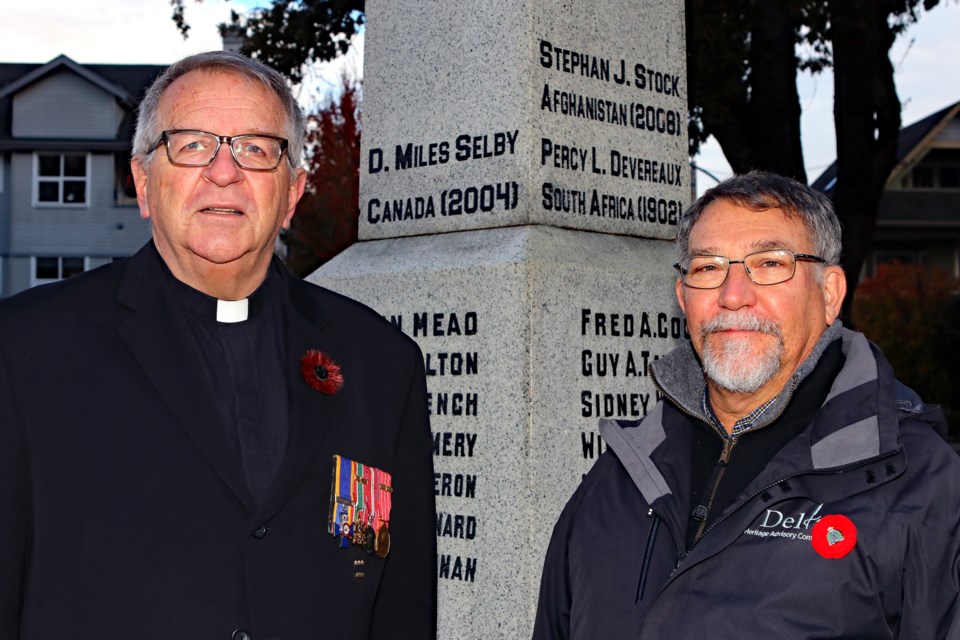Padre Jim Short made a promise while serving in Afghanistan as chaplain, never to forget Stephan John Stock. Now that promise has been fulfilled with the addition of his name, and two others from Delta, onto the cenotaph in Ladner’s Memorial Park.
“It brings me a lot of satisfaction,” said Short.
Short met Stock while they were in training for deployment in Wainwright, AB, when they learned they were both from Delta.
Stock, attended South Delta Secondary and was a combat engineer serving as part of the Canadian contribution to NATO’s International Security Assistance Force. He and two others died on Aug. 20, 2008 on their way back to Kandahar base after their vehicle hit an IED.
Short was serving there as senior chaplain when Canada lost a total of 19 soldiers that year.
He provided the prayer service for Stock and arranged for his body to be returned to Canada.
“So that’s why this is kind of important to me. It’s part of my own personal journey of remembrance and grief and honouring that promise that I made that I wouldn’t forget these guys, because in reality, I think about them every day,” said Short.
After researching how to add names to the cenotaph, he and local historian Peter Broznitsky found there was no process.
They then suggested to the city two criteria for having a name added to the cenotaph. The veteran’s name must be listed in the Books of Remembrance in Ottawa that lists all those who died on duty, in uniform, and those listed on the cenotaph must also have lived in Delta.
Short approached Delta council who approved and paid for adding the names.
“These are all Delta names, with Delta families, with strong ties to our community. It’s our obligation to ensure that they have a place of remembrance on the cenotaph permanently,” said Coun. Dylan Kruger of the unanimous approval by council of the request.
The city also received a letter from the B.C. branch of the Royal Canadian Legion saying it would be appropriate to add the names.
“It’s, I think, really important closure for the families and for the Silver Cross mothers to be able to have that opportunity. Their children made the ultimate sacrifice in defence of our country. It’s important we honour them,” Kruger added.
A private ceremony will take place today (Nov. 10) at the cenotaph to recognize the servicemen and their families.
The two other names of former Delta residents, Capt. D. Miles Selby and Trooper Percy Leonard Devereaux, also were added to the cenotaph.
Selby died in a mid-air collision with another Tutor jet on Dec. 10, 2004 while training in Saskatchewan. He had been training for his new solo position with the Canadian Forces Snowbirds flight demonstration team. Selby had served in Kosovo and was a CF-18 pilot and was 31 years old when he died. He had lived in Tsawwassen where he joined the 828 Hurricane Royal Canadian Air Cadet Squadron.
Devereaux came to Ladner in 1891, then went to South Africa in 1901 to fight in the Boer War. He died of his injuries there in May 1902.
Short said representatives of all three families will be at today’s ceremony.
“They’re really excited and honoured that someone would remember someone in their family,” he said of Devereaux. “We now have a process for the future, which I think is important. These are the first names that have been added since the Second World War.”
Short would also like to see cenotaphs updated across the country by having local names added to recognize those who died while in uniform.
A video company has created a short documentary which he’ll present to Veterans Affairs Canada in the hopes of showing others across Canada how to add names.
“We just want to light the spark and get people thinking about it,” he said.
He doubts if many names have been added to cenotaphs since the Korean War because operations such as peacekeeping may have been mentally and emotionally distant for Canadians, as compared to the First and Second World Wars.



